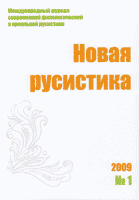
Русская поэзия как феномен чешского перевода
The study presents a general survey of the development of modern Czech translations of Russian poetry, emphasizing several accompanying relevant topics (differences in the two prosodic systems, development of translation theory, in particular a growing emphasis on semantic and stylistic equivalence of the final translated text, and the role of a different cultural and time context of the receiving literature). Using several illustrative samples of Czech interpretations of the poetry of A. S. Pushkin, A. Akhmatova and N. Gumilyov, the author documents a phenomenal position of translations of poetry in the modern Russian-Czech cultural dialogue.
More...
